4B M1U3知识点整理
4BM1U3知识点梳理(最新整理)

4B Oxford Primary English Module 1 Unit 3 Look at the shadow!知识点梳理◆核心单词◆核心短语课文中不同时段太阳及影子的变化:WhenHow about the sun How about the shadow Where’s the shadow in the morning 在上午The sun rises.太阳升起。
The shadow is long.影子长。
on the lawn 在草坪上at noon 在正午The sun is high in the sky.太阳高挂在空中。
The shadow grows short.影子变短。
on the bench 在长凳上in the evening 在傍晚The sun goes down.太阳落下。
The shadow grows long again.影子再次变长。
on the path 在小路上on the lawn 在草坪上on the bench 在长凳上on the path 在小径上rise behind the hill 从山后升起in the sky 在天空中at seven o’clock 在七点in the morning/afternoon/evening 在早上/下午/傍晚(午夜前)at noon/night/mid-night 在正午/夜晚/半夜go down (太阳)落山 grow long/short 变长、变短cut...out 剪出black shape 黑影make a shadow 形成影子go with 和…一起走play with the shadow 和影子一起玩be afraid of 害怕walk down 沿着……走look back 回头看play with 和…一起玩run after 在后面跑fall into 跌入burst in to tears 突然大哭run away 跑开stay behind...待在……之后cry in fear 害怕的哭了on the wall 在墙上look at 看一下hill 小山lawn 草坪path 小路bench (benches)长凳(the)sun 太阳moon 月亮 shadow 影子rise 上升high 高的torch 手电筒follow 跟随bite 咬bee 蜜蜂tea 茶 sea 大海deer 鹿beer 啤酒tear 眼泪fear 害怕stick粘 again 再一次also 也often 常常sometimes 有时grow 成长stay 停留afraid 害怕的shape 形状stop停止scared惊吓wait等待stop停止核心语法:【客观真理】即为一般现在时:一般现在时的动词三单一表达用法:当遇到句子主语为第三人称单数情况下动词使用三单一形式(特殊三单一动词的变形要牢记!)时间状语或判断依据:always总是, usually经常, often通常, sometimes有时, never从未, every….每……(频度副词)默写句型:In the morning, the sun rises behind the hill.在早晨,太阳从山后升起。
[译林版]4B Unit3知识点梳理-全面
![[译林版]4B Unit3知识点梳理-全面](https://img.taocdn.com/s3/m/b4a3f398cf2f0066f5335a8102d276a2002960b3.png)
[译林版]4B Unit3知识点梳理-全面译林版4B Unit3知识点梳理-全面本文档总结了译林版4B Unit3的重点知识,以帮助同学们更好地理解和掌握相关内容。
1. 词汇本单元涵盖了以下重点词汇:- 城市 (city)- 乡村 (countryside)- 岛屿 (island)- 山脉 (mountain range)- 森林 (forest)- 草原 (grassland)- 沙漠 (desert)- 河流 (river)- 湖泊 (lake)- 海洋 (ocean)- 景点 (tourist attraction)- 建筑物 (building)- 交通工具 (means of transportation)- 旅游 (travel)- 观光 (sightseeing)2. 语法本单元的语法重点包括:- There is/There are 句型- 比较级和最高级的形容词和副词用法- 表达地点的介词 in/on/at3. 句型本单元的句型重点如下:1. There is a city in the south of China. (中国南方有一个城市。
)2. There are many buildings in my hometown. (我的家乡有很多建筑物。
)3. The Great Wall is longer than the Yangtze River. (长城比长江更长。
)4. Shanghai is one of the biggest cities in the world. (上海是世界上最大的城市之一。
)5. Beijing is the capital of China. (北京是中国的首都。
)6. I live in a small village. (我住在一个小村庄。
)7. I want to go to the beach for vacation. (我想去海滩度假。
学习报4BM1U3英文报
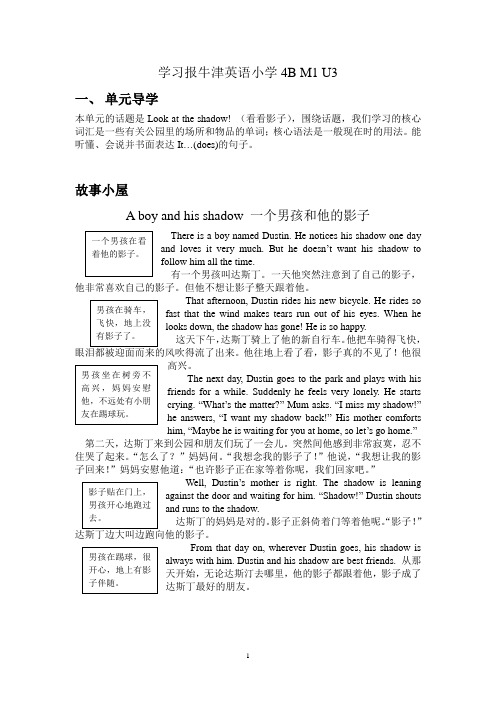
学习报牛津英语小学4B M1 U3一、 单元导学本单元的话题是Look at the shadow! (看看影子),围绕话题,我们学习的核心词汇是一些有关公园里的场所和物品的单词;核心语法是一般现在时的用法。
能听懂、会说并书面表达It …(does)的句子。
故事小屋A boy and his shadow 一个男孩和他的影子There is a boy named Dustin. He notices his shadow one dayand loves it very much. But he doesn ’t want his shadow tofollow him all the time.有一个男孩叫达斯丁。
一天他突然注意到了自己的影子,他非常喜欢自己的影子。
但他不想让影子整天跟着他。
That afternoon, Dustin rides his new bicycle. He rides so fast that the wind makes tears run out of his eyes. When he looks down, the shadow has gone! He is so happy. 这天下午,达斯丁骑上了他的新自行车。
他把车骑得飞快,他很高兴。
The next day, Dustin goes to the park and plays with his friends for a while. Suddenly he feels very lonely. He starts crying. “What ’s the matter?” Mum asks. “I miss my shadow!” he answers, “I want my shadow back!” His mother comfortshim, “Maybe he is waiting for you at home, so let ’s go home.”第二天,达斯丁来到公园和朋友们玩了一会儿。
(完整版)上海牛津4BM1-M2知识点整理
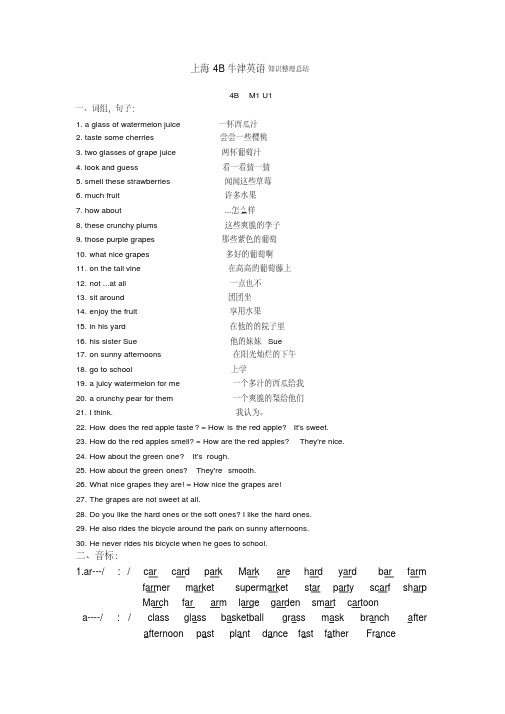
上海4B牛津英语知识整理总结4B M1 U1一、词组,句子:1.a glass of watermelon juice 一杯西瓜汁2.taste some cherries 尝尝一些樱桃3.two glasses of grape juice 两杯葡萄汁4.look and guess 看一看猜一猜5.smell these strawberries 闻闻这些草莓6.much fruit 许多水果7.how about ...怎么样8.these crunchy plums 这些爽脆的李子9.those purple grapes 那些紫色的葡萄10.what nice grapes 多好的葡萄啊11.on the tall vine 在高高的葡萄藤上12.not ...at all 一点也不13.sit around 团团坐14.enjoy the fruit 享用水果15.in his yard 在他的的院子里16.his sister Sue 他的妹妹Sue17.on sunny afternoons 在阳光灿烂的下午18.go to school 上学19.a juicy watermelon for me 一个多汁的西瓜给我20.a crunchy pear for them 一个爽脆的梨给他们21.I think. 我认为。
22.How does the red apple taste? = How is the red apple? It's sweet.23.How do the red apples smell? = How are the red apples? They're nice.24.How about the green one? It's rough.25.How about the green ones? They're smooth.26.What nice grapes they are! = How nice the grapes are!27.The grapes are not sweet at all.28.Do you like the hard ones or the soft ones? I like the hard ones.29.He also rides the bicycle around the park on sunny afternoons.30.He never rides his bicycle when he goes to school.二、音标:1.ar---/ ɑ: / car card park Mark are hard yard bar farmfarmer market supermarket star party scarf sharpMarch far arm large garden smart cartoona----/ ɑ: / class glass basketball grass mask branch after afternoon past plant dance fast father France2. u ---- / u: / blue glue true Sue ruler ruleui ----/ u: / fruit juice juicyo----- / u: / do to who whoseoo----/ u: / afternoon school cool moon room smooth food tooth zoo soon spoon noodles cartoon choose tooroot balloon三、短文诵读:Sour grapesOne day, a fox is thirsty. He is looking for (寻找)some water. Then he sees some bunches of grapes on the tall vine. The grapes are purple and r ound. They’re smooth and soft. What nice grapes! The fox looks at the grapes. He thinks the grapes are sweet and juicy. He wants them. The fox jumps and jumps. But he can’t touch the grapes.Suddenly(突然)a bird is coming. She sees the grapes too. She flies to the grapes and eats the grapes happily. The fox is angry:“These are my grapes! Go away!”The bird says:“Haha! You can’t fly high and enjoy(享受)the nice grapes. So they are my grapes.”The fox is envious /'envi?s/ (嫉妒的). “Oh! Those grapes are sour. They are not sweet at all!” Then the fox goes away.4B M1 U2一、词组,句子:1.whose knife 谁的小刀2.these blunt knives 这些钝的小刀3.those sharp pencils 那些锋利的铅笔4.Jill's pencil case Jill的铅笔盒5.many thick books 许多厚的书6.some thin books 一些薄的书7.walk on the beach 在海边走8.Kitty and her parents Kitty和她的父母亲9.much soft sand 许多软的沙子10.take off her shoes 脱下她的鞋子11.put on their coats 穿上他们的外套12.of course 当然可以13.the key to the door 开门的钥匙14.the key to the question 问题的答案15.the man over there 在那里的男子16.take the key to the lost-property office 失物招领处17.the blind brothers 盲兄弟18.touch the elephant 碰碰象19.one of the pupils 学生中的一个20.another brother 另一个兄弟21.smooth and hard 又光滑又硬22.big and thick 又大又厚23.the last blind boy 最后一个失明的男孩24.say about the elephant 说说大象25.some fruit for him 给他的一些水果26.some drinks for her 给她的一些饮料27.in the school yard 在学校的院子里28.a slim girl 一个苗条的女孩29.a red new skirt 一条新的红裙子30.too small 太小31.find her purse 找到她的小包32.on the floor 在地板上33.behind the door 在门后34.want to do sth. 想要做某事35.her cousin Laura 她的表妹Laura36.give sth. to sb. = give sb. sth. 把某物给某人37.take sth. to sb. = take sb. sth. 拿某物给某人38.Give the thin book to Grandma. = Give Grandma the thin book.39.Take the key to the lost-property office.40.How does the pineapple feel? = How is the pineapple? It's rough and hard.41.How do the pillows feel? = How are the pillows? They're soft.42.Whose books are those? = Whose are those books? They're Miss Fang's.43.What's the matter with you? = What's wrong with you?44.There's something in the sand.45.Here comes a man on an elephant.46.The brothers can hear the elephant, but they cannot see it.47.' It's an elephant,' answers the man, ' You can touch it. How does it feel? '48.' It's over there,' says her mum, ' Just behind the door!'49.She wants to buy a new purse.50.He likes eating and drinking. = He likes to eat and drink.二、音标:1. ir /?:/shirt bird third thirsty first girl skirt birthdayur /?:/purse nurse Thursdayer /?:/her certainly(当然) term (学期)or /?:/work worker world wordear /?:/ early learn2. au /?:/ warm war quarter 一刻钟al /?:/ all ball call fall hall small tall walk always aw /?:/draw strawberry prawn虾au /?:/August autumn daughter 女儿because Laura oor /?:/door floorour /?:/your four fourteenore /?:/ more before4BM1 U3一、词组,句子:1.behind the hill 在小山丘后面2.the tree’s shadow 树的影子3.on the lawn 在草坪上4.at noon 正午5.high in the sky 高高挂在天上6.grow short 变短7.these benches 这些长凳8.go up = rise 升起9.go down = set 落下10.grow long again 又变长11.on the path 在小路上12.cut them out 把它们剪下来13.stick a pencil 黏上铅笔14.shine the torch 打开手电筒15.turn on the torches 打开手电筒16.at seven o’clock in the morning 在上午七点17.go with me 跟我走18.stay behind me 呆在我后面19.walk in front of him 走在我前面20.take a walk 散步21.go to work 上班22.grow big and strong 变得又大又强壮23. a beautiful sunny day 一个美丽的好天24.walk down the road 沿着小路向下走25.hear a sound 听见一种声音26.look back 回头看27. a black shape 一个黑色的图形28.bite her 咬她29.be afraid of the dog 害怕狗30.run away 逃走31.follow them 跟着他们32.play together 一起玩33.play with the shadow 玩影子34.run after 跟着跑,追赶35. a big black dog 一个大黑狗36.go off 消失37.not …any more 再也不38.have tea with his friend Miss Deer 与他的朋友Deer小姐一起喝茶39.fall into the pond 掉到池塘里40.cry in fear 害怕得哭41. a bottle of beer 一瓶啤酒42.burst into tears 突然哭起来43.burst into laughter 突然笑起来44.be like = look like 像…45.You won’t see it any more. 你再也看不见它。
四年级上册M1-M3复习要点

四年级上册复习要点M1U1四会词,句:soon,tell,still,April,dancing,also,American.Where does she/he live? She/He lives in London. It was my birthday on Saturday .We were at Buckingham Palace.Soon 不久(副词)We’ll be home soon.Tell 告诉(动词)tell sb….about sth…告诉某人关于某事sb. ( 用人的宾格) him ,her , me, us , them,…Can you tell me about Halloween .Where does she live ? She lives in London. 时态为一般现在时。
She 是第三人称单数,所以问句中的助动词为does,答句中动词live后需加“S”.What’s she/he doing? He’s/ She’s ….. 时态为现在进行时,表示正在发生的事情,句中谓语动词换成现在分词形式,既动词后加“ing”. I’m reading a letter. He is playing football.M1U2Still 仍(副词)April 四月(名词)in April 在四月。
dancing 舞蹈(名词)动词+ing构成的动名词。
dance 去掉“e”+ing 构成的。
American 美国人,美国的America 美国人+like(s) doing sth. 某人喜欢某物English 英国人,英国的England 英国sth.Mexican 墨西哥人,墨西哥的Mexico 墨西哥I’ve got a new friend too. 我也有一个新朋友。
Indian 印度人,印度的India 印度I’ve got =I have got She’s got=She has gotRussian 俄罗斯人,俄罗斯的Russia 俄罗斯It’s warm. 天气暖和。
【个人精心制作】新译林英语4BUNIT3单元知识点整理及单元练习题(K12教育文档)
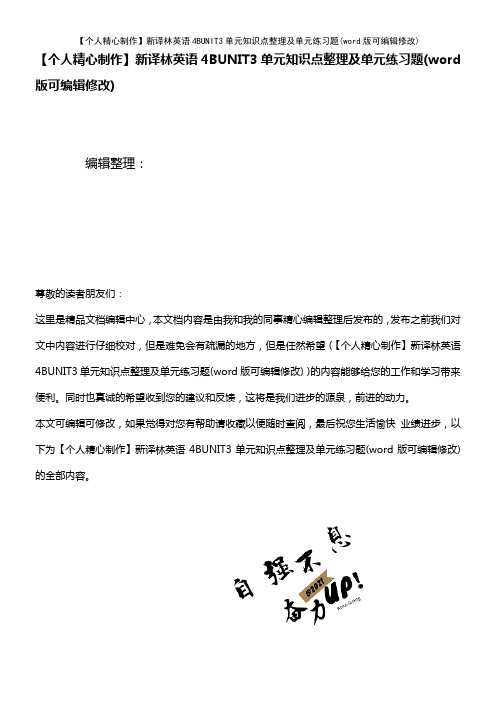
【个人精心制作】新译林英语4BUNIT3单元知识点整理及单元练习题(word 版可编辑修改)编辑整理:尊敬的读者朋友们:这里是精品文档编辑中心,本文档内容是由我和我的同事精心编辑整理后发布的,发布之前我们对文中内容进行仔细校对,但是难免会有疏漏的地方,但是任然希望(【个人精心制作】新译林英语4BUNIT3单元知识点整理及单元练习题(word版可编辑修改))的内容能够给您的工作和学习带来便利。
同时也真诚的希望收到您的建议和反馈,这将是我们进步的源泉,前进的动力。
本文可编辑可修改,如果觉得对您有帮助请收藏以便随时查阅,最后祝您生活愉快业绩进步,以下为【个人精心制作】新译林英语4BUNIT3单元知识点整理及单元练习题(word版可编辑修改)的全部内容。
新译林英语4BUNIT3单元知识点整理及单元练习题Unit3 My dayU3中主要的词组句子都在书上P18—19,多记多写。
单元练习题一.单词听写1.通常__________________2。
午饭__________________ 3.早饭__________________4。
足球__________________ 5。
晚上__________________6.晚饭__________________7.家庭作业__________________ 8。
电视__________________9.时刻表_________________10.星期二__________________二.词组翻译1.起床__________________2。
在七点__________________3.去上学__________________4。
有四节英语课__________________ 5。
在早上__________________6.在下午__________________7.踢足球__________________8。
回家__________________9。
4BM1U3知识点梳理

4B Oxford Primary English Module 1 Unit 3 Look at the shadow!知识点梳理◆核心单词◆核心短语课文中不同时段太阳及影子的变化:核心语法:【客观真理】即为一般现在时:一般现在时的动词三单一表达用法:当遇到句子主语为第三人称单数情况下动词使用三单一形式(特殊三单一动Week3 Name__________ Class___________一、Look and write(理解句子意思,填上适当的单词完成句子,每线一词):1. --- Is this a road? --- __________, it’s a __________. It’s narrow(狭窄的).2. --- What can you see in the morning?--- Oh, the __________ rises __________ the mountain.3. --- Little boy, what can you paint? --- I can __________ a ____________. It’s small. It's yellow and black. It can fly. It goes,’Buzz, buzz...’4. Look, the sun ___________ down in the __________.5. --- Is it in the ________ ______ in the afternoon? --- It’s in the afternoon. The sun is very high.6. Please don’t walk on the ___________. The grass is small.二、Read and write(用所给单词的适当形式填空,每线一词):1. Please _________ (look) at the moon. It __________ (rise) in the evening.2. --- Can you _____ (see) the sun in the evening? --- No, I _____ (can not)3. --- What colour _________ (be) the hill? --- It _________ (be) green.4. --- How many _________ (bench) can you see? --- I can see one _________ (bench).5. --- Whose ________ (friend) are these? --- They’re ________ (Linda).6. Look, the _______ (tree) shadow is on the lawn. It ________ (grow) short.7. My sister ________(stay)with her grandma every Sunday. She_____(go)to her mother’s home every Monday.8. After school, sometimes my friend_______(make) some paper works, sometimes he______(play)his parents.三、Read and write(读一读,填上与划线单词属于同类的单词,每线一词):1. We can see the sun, the __________ and the __________ in the sky.2. I can sit on the sofa, on the __________ and on the ___________.3. I read a book in the morning. I play football in the _________ and I watch TV in the _________.4. I am tall. My little sister is _________ and my big brother is _________.5. Alice reads a book, __________ a kite and __________ a rope every morning. She’s busy.四、Choose the best answer(选择最佳答案,将字母代号写在前面的括号内):( ) 1. Don’t walk on the __________.A. roadB. pathC. lawn( ) 2. We can see the __________ in the afternoon.A. sunB. moonC. stars( ) 3. You are tired. Please sit on the __________.A. watchB. benchC. peach( ) 4. In the morning, the sun __________.A. goes downB. go upC. rises( ) 5. The shadow is very short in the __________.A. morningB. afternoonC. evening( ) 6. There is much tall grass ___________ the lawn.A. onB. inC. under( ) 7. In the evening, the shadow is very __________.A. longB. shortC. fat( ) 8. At noon, the tree’s shadow __________ short.A. growB. growsC. growing( ) 9. Look ___________ the sea ___________ summer.A. at...onB. to... inC. at... in( ) 10. In the evening, the sun __________ down.A. goB. is goC. goes( ) 11. Look, the hippo __________ eating grass.A. likeB. is likeC. likes( ) 12. In the morning, the tree’s shadow is __________.A. longB. highC. short( ) 13. There are some small trees __________ the lawn.A. onB. besideC. under( ) 14. My shadow __________ short and small __________ noon.A. grows... atB. grows... inC. plays... at五、Rewrite the sentences(按要求改写下列句子,每线一词):1. These are Mrs Wang’s shadows. (根据划线提问)__________ __________ are __________?2. There are many tall trees on the hill (改为一般疑问句)_______ _______ _______tall ___________ on the _______?3. Is that a long bench?(改为复数句)__________ __________ long __________?4. The paths are very long. (改为否定句,保持句意不变)The ________ __________ very _______.5. Is it a bench? Is it a chair?(改为选择疑问句)_______ ________ a bench __________ a chair?6. My friend goes to school on foot everyday.(改为一般疑问句)_______ _______ _______ _______ _______ _______ _______ _______ _______.7. We have some books in our bags.(改为一般疑问句)_______ _______ _______ _______ _______ _______ _______bags.8. My sister is like her mother.(改为一般疑问句)______ ______ ______ ______ ______ mother?9. Henry hears a sound.(根据划线提问)______ ______ ______ ______?六、Reading comprehension(阅读理解):This is a picture of a park. It’s Zhongshan Park. It’s not big, but it’s nice. In it, you can see the lawns. One is big and two are small. Some boys are playing football on the big one. Ben and Jim can run very fast. They are tired, but they are very happy. Some girls are skipping a rope on the small one. Beside the lawns, there is a path. It’s clean and long. An old man and a young man are walking on the path. They are talking together. What’s that under the bench? It’s a dog. It plays with a white ball.Part 1 Read and judge(阅读短文,判断正误,用T或F表示)( ) 1. It’s a picture of Zhongshan School.( ) 2. There are two big lawns there.( ) 3. Ben and Jim can play football.( ) 4. A path is in front of the lawns.( ) 5. We can see two men on the bench.Part 2 Answer the questions(根据短文,回答问题,每线词数不限):1. How is the park in the picture? _________________________________2. Is there a big lawn there? _____________________________________3. How many men are there on the path? ___________________________4. What’s under the bench? ______________________________________5. What colour is the ball? _______________________________________。
[译林版]4B U1-U4知识点精华提炼
![[译林版]4B U1-U4知识点精华提炼](https://img.taocdn.com/s3/m/0f70e7d3aff8941ea76e58fafab069dc502247f1.png)
4B Unit1 知识点1.what subjects 和what lessons 的区别及考点what 后面的学科和课要加s; 即what subjects 和what lessons; what subjects 讲的是科目、学科,subjects 一般和like 连用; 如:What subjects do youlike? 你喜欢什么学科?特殊情况:若强调本学期有什么科目,subjects 可与have 连用;如:What subjects do you have this term(学期)?这学期你有什么科目啊?what lessons 讲的是每天要上的课,lessons 一般和have 连用; 如:What lessons do you have? 你有什么课?2.学科类名词首字母要大写; 如:Science;Chinese;Art;English;Maths;Music;PE 等3.评价某个学科有趣用It's fun; It's cool.4.今天早上用this morning; 在早上用in the morning;5.操场前面要加the; 如go to the playground 去操场6.多个学科并列时要用逗号隔开(不能用顿号),最后两个单词之间要用and 连接;否定句中and 改成or1.星期考点4B Unit2 知识点①星期一到星期天分别是(拼写):星期天Sunday;星期一Monday;星期二Tuesday;星期三Wednesday;星期四Thursday;星期五Friday;星期六Saturday;②英语中,一个星期的第一天是星期天;如考题: Sunday is the first(第一) day of a week(一周).③在星期几前面的介词用on; 即on + 星期几;在星期几的上午或下午直接在星期后加morning 或afternoon;如:on Sunday morning 在星期天上午④对星期几提问特殊疑问词用What day; 回答星期几用It's + 星期几;2.It's time for / to 考点(是时候做...)It’s time for 后接名词如:It's time for school. school 为名词It's time to 后接动词词组如:It’s time to go to school. go to school 为动词词组3.some、any 考点①some 在部分疑问句和否定句中要改为any②用于征求对方意见并且希望得到肯定答复的时候,some 无须改为any;总结为以下3 种情况(1) Would you like some ... ? (2)What/How about some ... ? (3)Can I have some ...?4.like 考点①like 后接可数名词要用复数形式; 如:like mangoes②like 后接动词时要用动词ing 形式; 如:like playing basketball△Who are we? 我们是谁?△We meet Miss Li at three. 我们在三点见到李老师。
[译林版]4B Unit1-4 知识点整理
![[译林版]4B Unit1-4 知识点整理](https://img.taocdn.com/s3/m/2193edbbe43a580216fc700abb68a98271feac98.png)
4B Unit1 Our school subjects知识点1.学科类名词首字母大写,如Chinese;Maths.2.what subjects和what lessons区别:①what后面的学科和课要加s,即what subjects和what lessons;②what subjects是科目、学科,subjects一般和like连用;如:What subjects do you like?你喜欢什么学科?答:I like...③what lessons是课,lessons一般和have连用;如:What lessons do you have?你有什么课?答:I have...特殊情况:如果强调的是本学期有什么科目,subject与have连用3.评价某个学科有趣:It's fun.4.今天早上this morning 在早上in the morning5. 多个学科并列前面用逗号,隔开,最后两个用and连接。
6. Nice to meet you. (初次见面)Nice to see you. (熟人见面)7.It’s time for+名词.=It’s time to +动词.如:It’s time for PE.=It’s time to have a PE lesson.It’s time for school.=It’s time to go to school.8.What about you?=How about you?你呢?9.Welcome back to+地点,欢迎回到某地10.操场前面加the: go to the playground去操场4BUnit2 After school知识点1.星期考点:①星期日到星期六(拼写):Sunday星期日;Monday星期一;Tuesday星期二;Wednesday星期三;Thursday星期四;Friday星期五;Saturday星期六;②一个星期的第一天是星期日;Sunday is the first(第一) day of the week.③星期前面介词用on;即on+星期几;on Tuesday morning;④对星期几提问:What day is it today? 答句:It's +星期几.2.some用于肯定句,any用于否定和疑问句如:I don’t have any lessons on Sunday.我在星期日没有课。
译林小学英语4B各单元知识点整理

梅花香自苦寒来4B Unit1 知识点一、词汇:school学校 subject课程 see看见 Chinese 语文(课)Maths数学(课) Art美术(课) Music 音乐(课)lesson课Monday星期一二、词组:1.our new timetable我们的新课表2.like Chinese 喜欢语文3.like Maths喜欢数学4.like English喜欢英语5.go to the playground去操场6.what lessons什么课7.what subjects 什么课程 8.this morning今天早上9.this afternoon今天下午10.don’t skate不滑冰11.make a cake做一个蛋糕 e and make a cake过来做一个蛋糕13.our school subjects 我们的学校课程 14.at school 在学校三、句子:1.Welcome back to school. 欢迎回校。
2.Nice to see you. 见到你很高兴。
3.What about you? 你呢?4.It’s fun. 有趣。
5.It’s time for PE. 该上体育课了。
6.A:What subjects do you like? 你喜欢什么科目?B:I like Art and Music.我喜欢美术和音乐。
7.A:What lessons do we have this morning?我们上午有什么课?B:We have English、Chinese、and Maths.我们有英语、语文和数学。
8.A:What lessons do you have this afternoon?我们下午有什么课?B:We have PE、Art、and Music.我们有体育、美术和音乐。
9.Kate,Kate,don’t skate. Come and make a cake.凯特,凯特,不要溜冰。
2022年4BUnit3知识点
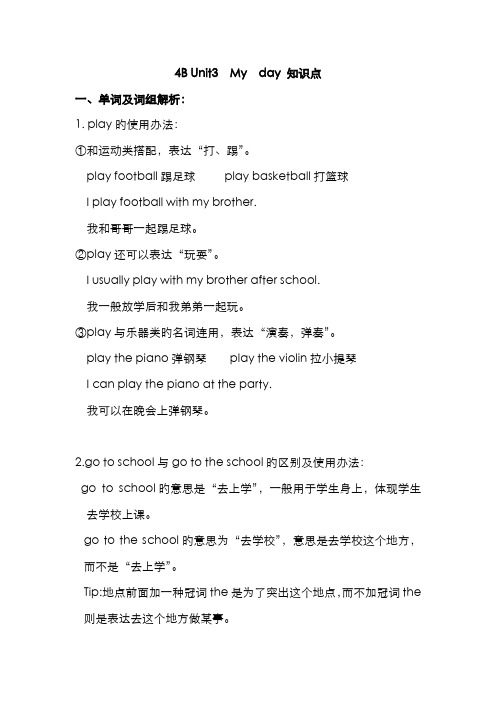
4B Unit3 My day 知识点一、单词及词组解析:1. play旳使用办法:①和运动类搭配,表达“打、踢”。
play football踢足球play basketball打篮球I play football with my brother.我和哥哥一起踢足球。
②play还可以表达“玩耍”。
I usually play with my brother after school.我一般放学后和我弟弟一起玩。
③play与乐器类旳名词连用,表达“演奏,弹奏”。
play the piano弹钢琴play the violin拉小提琴I can play the piano at the party.我可以在晚会上弹钢琴。
2.go to school与go to the school旳区别及使用办法:go to school旳意思是“去上学”,一般用于学生身上,体现学生去学校上课。
go to the school旳意思为“去学校”,意思是去学校这个地方,而不是“去上学”。
Tip:地点前面加一种冠词the是为了突出这个地点,而不加冠词the 则是表达去这个地方做某事。
3.in the evening与at night旳区别以及使用办法:Evening一般指“下午六点钟至晚上睡觉旳时间”,更倾向于表达傍晚旳意思。
而night一般是指“天黑至黎明天亮旳这段时间”,更倾向于体现九点后来,也就是睡觉之后旳时间。
ually:意为“一般,常常”,是一种频率副词,表达在平常生活中旳事情旳发生频率。
其他旳频率副词尚有:always总是often常常sometimes有时never从不eg. I usually go to school at seven.我一般在七点钟去上学。
5.时间旳体现法:直接表达法,也叫顺读法。
整点:钟点数(+o’clock)8:00—eight(o’clock)非整点:钟点数+分钟数5:20—five twenty二、句型:1. What time is it now?目前几点了?此句用于问询时间,一般回答可以用:It’s +时间或直接回答时间。
英语M1U3知识点梳理与练习学生版
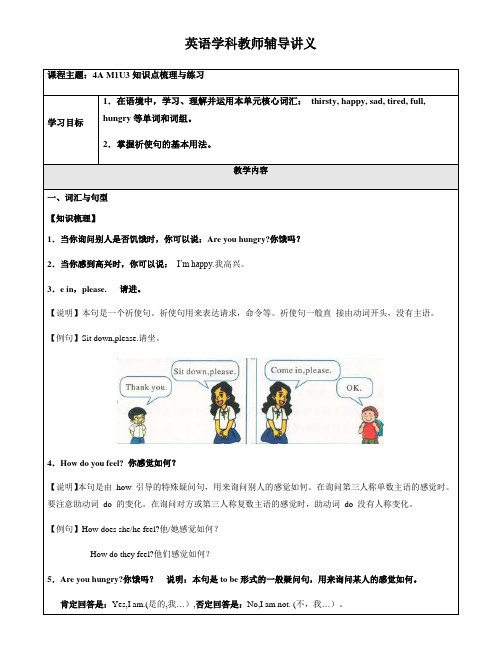
英语学科教师辅导讲义一、词汇与句型【知识梳理】1.当你询问别人是否饥饿时,你可以说:Are you hungry?你饿吗?2.当你感到高兴时,你可以说:I’m happy.我高兴。
3.e in,please. 请进。
【说明】本句是一个祈使句。
祈使句用来表达请求,命令等。
祈使句一般直接由动词开头,没有主语。
【例句】Sit down,please.请坐。
4.How do you feel? 你感觉如何?【说明】本句是由how 引导的特殊疑问句,用来询问别人的感觉如何。
在询问第三人称单数主语的感觉时。
要注意助动词do 的变化。
在询问对方或第三人称复数主语的感觉时,助动词do 没有人称变化。
【例句】How does she/he feel?他/她感觉如何?How do they feel?他们感觉如何?5.Are you hungry?你饿吗?说明:本句是to be形式的一般疑问句,用来询问某人的感觉如何。
肯定回答是:Yes,I am.(是的,我…),否定回答是:No,I am not. (不,我…)。
当问到对方的感觉时,可用“Are you ...?”或“Do you feel ...?”来提问。
如问到第三方时,要用“Is he/she ... ?”或“Does he/she feel ... ?”来提问。
6.I'm happy. 我高兴。
说明:happy为形容词,意思是“高兴的”。
I'm... (happy,sad ...)句型用来说明主语的情况。
在表达自己的感觉时,用“I am...”或“I feel... ”表示。
【例句】I am cold.我很冷。
【拓展】在表达不同人的感觉时,要注意be(am,is,are)动词的变化和feel的第三人称单数的变化。
【例句】I am sad. =I feel sad.我难过。
Ben is afraid. Ben很害怕。
Sam and Ginger are hungry. Sam 和Ginger 饿了。
4BM1U3知识点整理说课讲解
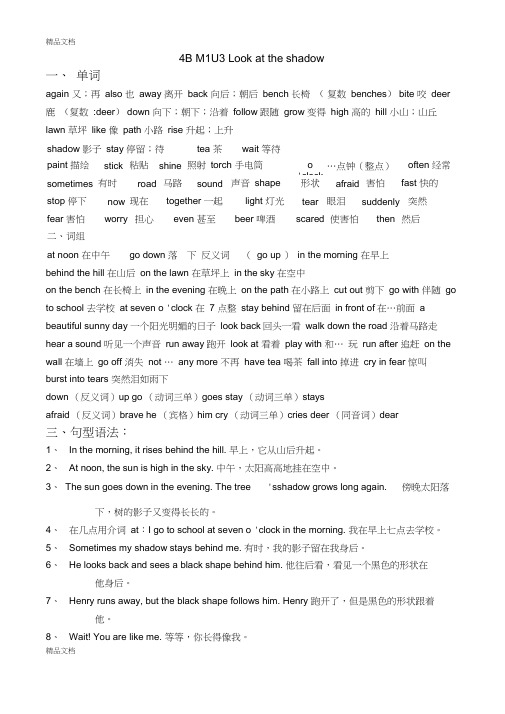
精品文档4B M1U3 Look at the shadow一、单词again 又;再also 也away 离开back 向后;朝后bench 长椅(复数benches) bite 咬deer 鹿(复数:deer) down 向下;朝下;沿着follow 跟随grow 变得high 高的hill 小山;山丘lawn 草坪like 像path 小路rise 升起;上升shadow 影子stay 停留;待tea 茶wait 等待paint 描绘stick 粘贴shine 照射torch 手电筒o'clock …点钟(整点)often 经常sometimes 有时road 马路sound 声音shape 形状afraid 害怕fast 快的stop 停下now 现在together 一起light 灯光tear 眼泪suddenly 突然fear 害怕worry 担心even 甚至beer 啤酒scared 使害怕then 然后二、词组at noon 在中午go down 落下反义词(go up )in the morning 在早上behind the hill 在山后on the lawn 在草坪上in the sky 在空中on the bench 在长椅上in the evening 在晚上on the path 在小路上cut out 剪下go with 伴随go to school 去学校at seven o 'clock 在7 点整stay behind 留在后面in front of在…前面a beautiful sunny day 一个阳光明媚的日子look back回头一看walk down the road 沿着马路走hear a sound 听见一个声音run away 跑开look at 看着play with 和… 玩run after 追赶on the wall 在墙上go off 消失not … any more 不再have tea 喝茶fall into 掉进cry in fear 惊叫burst into tears 突然泪如雨下down (反义词)up go (动词三单)goes stay (动词三单)staysafraid (反义词)brave he (宾格)him cry (动词三单)cries deer (同音词)dear三、句型语法:1、In the morning, it rises behind the hill. 早上,它从山后升起。
- 1、下载文档前请自行甄别文档内容的完整性,平台不提供额外的编辑、内容补充、找答案等附加服务。
- 2、"仅部分预览"的文档,不可在线预览部分如存在完整性等问题,可反馈申请退款(可完整预览的文档不适用该条件!)。
- 3、如文档侵犯您的权益,请联系客服反馈,我们会尽快为您处理(人工客服工作时间:9:00-18:30)。
4B M1U3 Look at the shadow
一、单词
again 又;再also 也away 离开back 向后;朝后bench 长椅(复数benches) bite 咬deer 鹿(复数:deer) down 向下;朝下;沿着follow 跟随grow 变得high 高的hill 小山;山丘lawn 草坪like 像path 小路rise 升起;上升shadow 影子stay 停留;待tea 茶wait 等待
paint 描绘stick 粘贴shine 照射torch 手电筒o’clock …点钟(整点)often 经常sometimes 有时road 马路sound 声音shape 形状afraid 害怕fast 快的stop 停下now 现在together 一起light 灯光tear 眼泪suddenly 突然
fear 害怕worry 担心even 甚至beer 啤酒scared 使害怕then 然后
二、词组
at noon 在中午go down 落下反义词(go up)in the morning 在早上
behind the hill 在山后on the lawn 在草坪上in the sky 在空中
on the bench 在长椅上in the evening 在晚上on the path 在小路上cut out 剪下go with 伴随go to school 去学校at seven o’clock 在7点整stay behind 留在后面in front of 在…前面 a beautiful sunny day 一个阳光明媚的日子look back 回头一看walk down the road 沿着马路走hear a sound 听见一个声音run away 跑开
look at 看着play with 和…玩run after 追赶on the wall 在墙上go off 消失not … any more 不再have tea 喝茶fall into 掉进cry in fear 惊叫
burst into tears 突然泪如雨下
down(反义词)up go(动词三单)goes stay(动词三单)stays
afraid(反义词)brave he(宾格)him cry(动词三单)cries deer(同音词)dear
三、句型语法:
1、In the morning, it rises behind the hill. 早上,它从山后升起。
2、At noon, the sun is high in the sky. 中午,太阳高高地挂在空中。
3、The sun goes down in the evening. The tree’s shadow grows long again. 傍晚太阳落
下,树的影子又变得长长的。
4、在几点用介词at:I go to school at seven o’clock in the morning.我在早上七点去学校。
5、Sometimes my shadow stays behind me. 有时,我的影子留在我身后。
6、He looks back and sees a black shape behind him. 他往后看,看见一个黑色的形状在
他身后。
7、Henry runs away, but the black shape follows him. Henry跑开了,但是黑色的形状跟着
他。
8、Wait! You are like me. 等等,你长得像我。
9、The black shape runs after Henry. 黑色的形状追赶着Henry。
10、And when the light goes off, you won’t see it any more.当灯光消失,你不再能看见它。
11、Suddenly he falls into the tea, and Miss Deer cries in fear. 突然他掉进茶里,Miss Deer
惊叫起来。
12、Miss Deer says, ‘You scared me!’ And the she bursts into tears. Miss Deer说“
你吓到我了!”然后突然泪如雨下。
四、重点语法。
1、一般现在时:表示通常性、规律性、习惯性的状态或者动作(有时间规律发生的事件)的一种时间状态。
一般看到sometimes,often, always,every day,都用一般现在时。
构成:分2种情况
(1)当主语是非三单时肯定句:主语+动词原形+其它
否定句:主语+don't+动词原形+其它
一般疑问句:Do+主语+动词原形+其它
(2)当主语是三单时肯定句:主语+动词三单形式(一般加s/es)+其它
否定句:主语+doesn't+动词原形+其它
一般疑问句:Does+主语+动词原形+其它动词三单变化规则: a.一般直接加s(looks, runs)
b.o,s, x, ch, sh结尾的加es(watches,washes)
c.以辅音+ y结尾的词(studies cries)
2、介词
(1)in the morning in the afternoon in the evening in+月份,in+季节,in+国家(2)at noon at night at school at home at seven o’clock
on on+具体某一天on+星期几
(3)。
